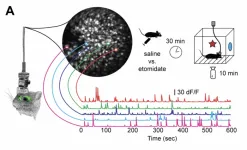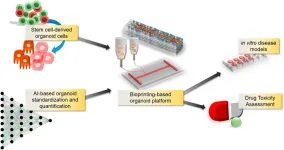(Press-News.org) Coinciding with the increased support for populist parties that we have witnessed all over the West, the last decade has also seen an increase in the number of populism-related studies, covering topics such as the causes and consequences of voting for parties that support these ideas, or the reasons for and possible consequences of the emergence and increasing presence of the attitudes on which they are based.
The links between conspiracy theories and populism have also aroused a great degree of interest. Carolina Galais, a researcher at the Universitat Autònoma de Barcelona's (UAB) Department of Political Science and Public Law, and Marc Guinjoan, an associate professor and researcher at the Universitat Oberta de Catalunya's (UOC) Faculty of Law and Political Science, analysed these possible links in their study, "I want to believe: The relationship between conspiratorial beliefs and populist attitudes in Spain", which has recently been published for open access in the journal Electoral Studies.
Different explanations for the same problem
There are different opinions when it comes to addressing this issue. Some authors believe that there is no clear distinction between conspiracy theory trends and populism because they are very similar or reflect the same mentality. Others, on the other hand, believe that one of these two factors is the trigger and driving force for change. Guinjoan and Galais are two such authors: "In our paper, we argue and empirically prove by means of various methodological strategies – including an experiment – that changes in populist thinking can be explained by conspiracy theories. Exposure to conspiracy theories makes people more likely to believe them, which in turn promotes populist thinking, particularly Manichaean thinking."
However, this does not mean that the opposite does not happen too, as populist thinking can also promote the tendency to believe in conspiracy theories. In fact, evidence has shown that the development of such ideas can be encouraged by the discourse of certain parties. "Both routes are possible and simultaneous: it will work one way for some people and the other way for others. Our paper focuses on proving the less explored route, according to which exposure to conspiracy theories encourages populist thinking," said the authors.
Two online surveys and an experiment
The authors started their study by carrying out an online survey of 2,887 adults. The aim was to establish if there was a link between those people who believe in four distinct conspiracy theories – those relating to 9/11, those relating to the pharmaceutical industry, those that claim that the world is dominated by secret groups, and those making claims about alien life – and a set of populist statements such as "many members of government are shameless" or "those who don't agree with my political views are misinformed". The authors indeed found a correlation: people who embrace conspiracy theories usually have populist attitudes.
The second part of the study involved a survey-based experiment: a group of participants were chosen at random and exposed to a conspiracy theory relating to the 9/11 attacks. Afterwards, they were asked a set of questions to find out their opinion about a number of strongly populist statements. The people who had been exposed to the conspiracy theory were much more likely to agree with them than those in the control group.
A world of good and evil
From among the various dimensions of populism, Manichaeism was the one most strongly affected by exposure to conspiracy theories. Manichaeism views society as split between good and evil, between those who are right and those who are wrong. According to the researchers, this idea fits well with conspiracy theories, which always involve an overarching plot concealing the truth about certain situations. This is something that we should be very aware of, because Manichaeism is probably behind other worrying phenomena seen in the last few decades, such as rising polarization and support for populist and even anti-establishment parties.
In turn, the other two dimensions of populism seemed unaffected by conspiracy theories. These two dimensions are anti-elitism, which is the rejection of the individuals and institutions in power, and people-centrism, which is based on the idea that popular sovereignty is the epitome of democracy and power should be held by the people. "Although we had reasons to expect conspiratorial thinking to affect these two dimensions as well, the data showed that, at least in Spain, this isn't the case. Being exposed to conspiracy theories and believing them causes us to see the world in black and white, as a fight between good and evil. People who see things in this way will view any coalition, agreement or compromise between political parties or stakeholders as a serious betrayal, and any concession to the other side will cause outrage and disenchantment," said Guinjoan and Galais.
In Spain, the country focused on by the study, the proportion of people who support conspiracy theories is average and very similar to the figures seen in other countries. As a result, Guinjoan and Galais believe that the results of their study can be extrapolated to other countries. They explained that: "we have no reason to believe that the correlation we found in Spain won't also apply in other contexts, even if we assume they're different in nature. Having said that, we can't provide a definitive answer to this question until an empirical analysis has been carried out in another country of interest."
Reference article
Guinjoan, Marc; Galais, Carol (2023). I want to believe: The relationship between conspiratorial beliefs and populist attitudes in Spain. Electoral Studies, Volume 81. https://doi.org/10.1016/j.electstud.2022.102574
This UOC research supports Sustainable Development Goals (SDGs) 16, Peace, Justice and Strong Institutions.
UOC R&I
The UOC's research and innovation (R&I) is helping overcome pressing challenges faced by global societies in the 21st century by studying interactions between technology and human & social sciences with a specific focus on the network society, e-learning and e-health.
Over 500 researchers and more than 50 research groups work in the UOC's seven faculties, its eLearning Research programme and its two research centres: the Internet Interdisciplinary Institute (IN3) and the eHealth Center (eHC).
The university also develops online learning innovations at its eLearning Innovation Center (eLinC), as well as UOC community entrepreneurship and knowledge transfer via the Hubbik platform.
Open knowledge and the goals of the United Nations 2030 Agenda for Sustainable Development serve as strategic pillars for the UOC's teaching, research and innovation. More information: research.uoc.edu.
END
Conspiracy theories cause populism to rise
This has been empirically proven by a study recently carried out by researchers at the UAB and the UOC
2023-04-11
ELSE PRESS RELEASES FROM THIS DATE:
Breast tomosynthesis improves screening in community settings
2023-04-11
OAK BROOK, Ill. – Researchers have found that digital breast tomosynthesis (DBT) has improved breast cancer screening performance in community practice and identifies more invasive cancers, compared to digital mammography. In addition, radiologists’ interpretive performance improved with DBT. The results of the study were published today in Radiology, a journal of the Radiological Society of North America (RSNA).
“Our study demonstrated that more radiologists in U.S. community practice are meeting recommended performance standards with digital breast tomosynthesis than ...
Key memory receptors are located on interneurons
2023-04-11
A key receptor regulating memory formation has been localized to interneurons, according to a study with implications for drug development. Robert Pearce and colleagues probed the localization of γ-aminobutyric acid type A receptors that incorporate α5 subunits (α5-GABAARs). α5-GABAARs are concentrated within the hippocampus, a brain structure that is essential for the formation of episodic memories. The general anesthetic etomidate blocks learning by targeting α5-GABAARs, as do many drugs designed to enhance cognition, intended for use in people with Alzheimer’s disease, ...
Bioprinting technology combined with artificial intelligence allows to obtain high quality in vitro models
2023-04-11
In the process of organoid manufacturing, bioprinting technology can not only facilitate the creation and maintenance of complex biological 3D shapes and structures, but also allow for standardization and quality control during production. And the addition of artificial intelligence, which can validate the product potential in the manufacturing process, allows to provide a more standardized source of cells for the organoid in terms of viability, function, etc. In other words, bioprinting combined with artificial intelligence is expected to perform real-time ...
Over 60 percent of Saudi Arabian respondents never took a colorectal cancer test | BGI Insight
2023-04-11
Colorectal cancer (CRC) is the most diagnosed cancer among males and third among females in Saudi Arabia, with up to two-thirds diagnosed at an advanced stage, according to the King Faisal Specialist Hospital & Research Centre. This report shows Saudi Arabia has a high percentage of respondents (62.7%) who never took CRC tests, far higher than global average of 54.1%. This shows the Kingdom's Early Cancer Detection Program still needs to build greater awareness among the public.
To uncover attitudes and the ...
A protective probiotic blunts the ill effects of alcohol in mice
2023-04-11
Highlights
Excessive alcohol consumption causes short-term and long-term health problems
An enzyme called ADH1B accelerates the breakdown of alcohol in the body
Researchers genetically engineered a probiotic to express ADH1B in mice
Mice treated with the probiotic recovered from alcohol exposure faster than untreated mice, and had fewer resulting health problems
Washington, DC – Excessive alcohol consumption leads to painful hangovers and accompanying headaches, fatigue, and nausea. Drinking alcohol has also been linked to a raft of health problems in the human body, including heart disease, cirrhosis, and immune deficiency. One way to avoid those consequences ...
Study finds disparate gender differences in victims of child sex trafficking
2023-04-11
In the United States, federal laws were created to effectively decriminalize prostitution in minors under the age of 18. However, state and local justice systems continue to arrest and incarcerate minors for prostitution, despite widespread agreement that youth involved in commercial sexual exploitation are victims, not offenders.
Most youth tend to fall victim to child prostitution and sex trafficking between the ages of 12 and 14. Victims of child prostitution have especially high rates of prior physical, sexual and emotional abuse as well as neglect.
Calli M. Cain, Ph.D., an assistant professor at Florida Atlantic University’s College of Social Work and Criminal ...
Press passes now available for NUTRITION 2023 to be held July 22–25 in Boston
2023-04-11
Complimentary press passes are now available for NUTRITON 2023, the annual flagship meeting of the American Society for Nutrition. Join us July 22-25 in Boston to hear about the latest developments in nutrition research, practice, and policy.
After three years of virtual meetings, NUTRITION 2023 will bring the nutrition community back together to share cutting-edge research on nutrition and food science, diet and disease, clinical applications, global health, and more. As one of the world’s largest nutrition ...
Precision magnetics could be game-changer for therapy-resistant brain cancers
2023-04-11
Scientists at The Hospital for Sick Children (SickKids) and the University of Toronto (U of T) have combined forces to develop a new approach to potentially treat tumour cells, called mechanical nanosurgery, even for aggressive, chemoresistant cancers.
Glioblastoma (GBM) is the most common and aggressive primary brain cancer. Despite various treatment options that exist, including surgery, radiotherapy, and chemotherapy, the median survival time for patients is only around 15 months.
The current global standard-of-care treatment for GBM patients includes chemotherapy using a drug called temozolomide (TMZ), which extends a person’s life expectancy by approximately two months compared ...
Migratory birds can partially offset climate change
2023-04-11
Ithaca, NY—Deteriorating habitat conditions caused by climate change are wreaking havoc with the timing of bird migration. A new study demonstrates that birds can partially compensate for these changes by delaying the start of spring migration and completing the journey faster. But the strategy comes with a cost—a decline in overall survival. The findings by researchers from Cornell University, the University of Maryland, and Georgetown University are published in the journal Ecology.
"We found that our study species, the American Redstart, can migrate up to 43% faster to reach its ...
KICT represents Korea in IEA’s Energy in Buildings and Communities Programme
2023-04-11
The Korea Institute of Civil Engineering and Building Technology (KICT, President Kim, Byung-suk) has been participating as Korea’s representative organization in the Energy in Buildings and Communities (EBC) programme, an Technical Cooperation Programme under the International Energy Agency (IEA), since 2005.
The International Energy Agency Energy in Buildings and Communities Programme (IEA EBC) is an international research organization with 25 member countries including the United States, Japan, Germany, France, and, more recently, Brazil and Turkey. Established in 1977 in response to the global energy crisis, EBC aims to conduct research on conserving energy and ...
LAST 30 PRESS RELEASES:
ACC announces inaugural fellow for the Thad and Gerry Waites Rural Cardiovascular Research Fellowship
University of Oklahoma researchers develop durable hybrid materials for faster radiation detection
Medicaid disenrollment spikes at age 19, study finds
Turning agricultural waste into advanced materials: Review highlights how torrefaction could power a sustainable carbon future
New study warns emerging pollutants in livestock and aquaculture waste may threaten ecosystems and public health
Integrated rice–aquatic farming systems may hold the key to smarter nitrogen use and lower agricultural emissions
Hope for global banana farming in genetic discovery
Mirror image pheromones help beetles swipe right
Prenatal lead exposure related to worse cognitive function in adults
Research alert: Understanding substance use across the full spectrum of sexual identity
Pekingese, Shih Tzu and Staffordshire Bull Terrier among twelve dog breeds at risk of serious breathing condition
Selected dog breeds with most breathing trouble identified in new study
Interplay of class and gender may influence social judgments differently between cultures
Pollen counts can be predicted by machine learning models using meteorological data with more than 80% accuracy even a week ahead, for both grass and birch tree pollen, which could be key in effective
Rewriting our understanding of early hominin dispersal to Eurasia
Rising simultaneous wildfire risk compromises international firefighting efforts
Honey bee "dance floors" can be accurately located with a new method, mapping where in the hive forager bees perform waggle dances to signal the location of pollen and nectar for their nestmates
Exercise and nutritional drinks can reduce the need for care in dementia
Michelson Medical Research Foundation awards $750,000 to rising immunology leaders
SfN announces Early Career Policy Ambassadors Class of 2026
Spiritual practices strongly associated with reduced risk for hazardous alcohol and drug use
Novel vaccine protects against C. diff disease and recurrence
An “electrical” circadian clock balances growth between shoots and roots
Largest study of rare skin cancer in Mexican patients shows its more complex than previously thought
Colonists dredged away Sydney’s natural oyster reefs. Now science knows how best to restore them.
Joint and independent associations of gestational diabetes and depression with childhood obesity
Spirituality and harmful or hazardous alcohol and other drug use
New plastic material could solve energy storage challenge, researchers report
Mapping protein production in brain cells yields new insights for brain disease
Exposing a hidden anchor for HIV replication
[Press-News.org] Conspiracy theories cause populism to riseThis has been empirically proven by a study recently carried out by researchers at the UAB and the UOC






